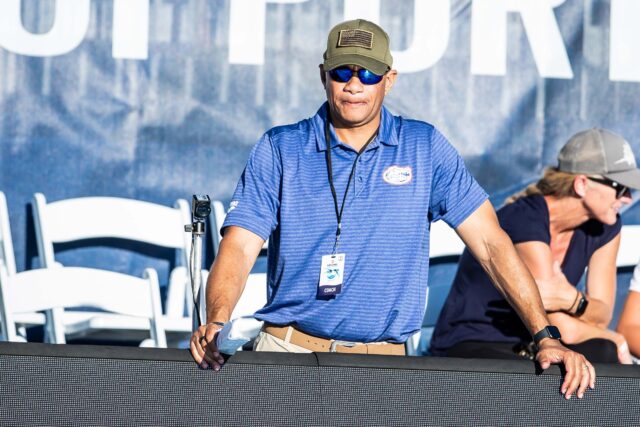By SwimSwam Contributors on SwimSwam

Courtesy: Corey He
We all know of the famous 100 butterfly showdown that took place at the 2008 Summer Olympics in Beijing: the head-to-head matchup between Michael Phelps and Milorad Cavic that was decided by one one-hundredth of a second. A magical half-stroke — one that many initially thought cost Phelps a victory — capped off one of the most exhilarating come-from-behind victories that we’ve seen in recent memory, keeping Phelps’ quest for eight golds alive.
If you’re reading this article, you must have — at some point in your life — seen or heard of Phelps’ seventh gold medal at the Beijing Olympics in the 100 fly. But this wasn’t the first time such a dramatic 100 butterfly showdown between two swimmers — one of them being an American superstar — took place on the Olympic stage.
Enter Anthony Nesty, current head coach of the Florida Gators.
In the 1980s, American swimmer Matt Biondi was considered one of the best and most well-rounded swimmers in the world. He specialized in the sprint freestyle events and butterfly events, and he was a prolific relay swimmer as well. Spoiler: he would go on to win five gold medals, one silver medal, and one bronze medal at the 1988 Seoul Summer Olympics, claiming four world records in the process.
The final of the men’s 100 fly was set to go on the fourth night of competition. Many had their eyes on Biondi, swimming out of Lane 5. There were predictions that a world record would fall.
And there was Nesty, swimming out of Lane 3 and representing Suriname — a small nation on the northeast coast of South America that had just one Olympic-sized pool in the entire country at the time. Nesty had won the 100 fly at the Pan American Games the year prior.
Biondi got off to a blazing start, quickly establishing himself as the swimmer to beat. He hit the halfway mark under world record pace and continued to increase his lead. But the drama was yet to unfold: Nesty, swimming just two lanes over, began to make his move on the home stretch.
The final meters of the race unfolded in dramatic fashion; slowly but surely, the rest of the field began to creep up on Biondi, though it seemed that the other contenders would run out of room to chase him down. And then, the unthinkable happened.
At the 99-meter mark, Biondi was still leading. At the wall, Nesty had stolen the gold medal, courtesy of a long — and I mean, looooooong, misjudged stroke — by Biondi. Nesty’s time: 53.00. Biondi’s time: 53.01.
One one-hundredth of a second. And perhaps one of the most exciting sprint butterfly races in Olympic history had just unfolded in front of a live crowd of thousands — and millions more watching at home.
For Biondi, this was just his second race of the Olympics. He would go on to win five more medals, taking home seven Olympic medals. Despite his overwhelming success, Biondi would later reflect on his regret in the 100 fly, even suggesting that he should have grown his fingernails a little longer. If there was one race across his illustrious career that Biondi would want to race all over again, it would undoubtedly be this race.
For Nesty, this race was an unfathomable achievement and a dream come true. As the first athlete from Suriname to ever win Olympic gold, Nesty’s story became an inspiration for swimmers around the world. Suriname issued currencies and stamps commemorating his historic achievement.
After this Olympic showdown, Nesty would remain undefeated in the 100 butterfly for three years. In a rematch at the 1990 Goodwill Games in Federal Way, Nesty would outduel Biondi once again, finishing in 53.42 to Biondi’s 53.82. Nesty would go on to capture the gold medal in the same event at the 1991 World Championships, and at the 1992 Barcelona Summer Olympics, Nesty would take home another bronze medal. This time, he finished behind another American phenom: Pablo Morales.
As crazy as it may seem, this story comes full circle: at the 2002 USA Swimming National Championships, Phelps out-touched butterfly specialist Ian Crocker in the 100 fly, breaking an American record in the process. Remarkably, Nesty was in attendance for that race — after the race, Nesty would personally congratulate Phelps. Phelps reflected in his 2009 autobiography that this moment made him realize the importance of a perfectly-timed finishing stroke.
And remarkably, just six years later, Phelps would replicate Nesty’s feat in a 100 fly Olympic final. I guess lightning does strike twice.
More than 30 years on, Nesty is still the only athlete from Suriname to ever medal at an Olympic Games. In the late 1990s, in recognition of their historic achievements, Nesty and Biondi were both enshrined in the International Swimming Hall of Fame. In their own unique ways, both swimmers had left behind remarkable impacts on the sport, inspiring countless young athletes around the world to chase their dreams — and to always race until the final touch.

![[SPOILER] has reportedly signed a deal to return to WWE](https://cdn.vox-cdn.com/thumbor/CdHmHdTxc3xS-b1XgKNSER6mOPQ=/0x149:1163x924/1310x873/cdn.vox-cdn.com/uploads/chorus_image/image/73321473/Screenshot_2024_05_01_at_6.47.12_PM.0.png)















You must be logged in to post a comment Login